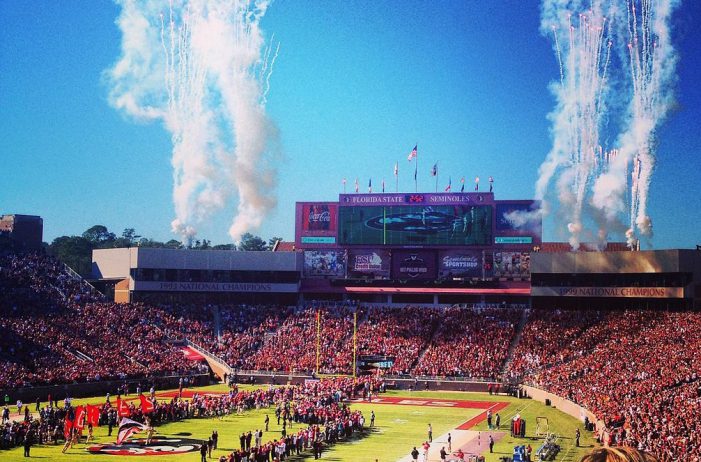By Samuel R. Staley, PhD*
City and county officials authorized more than $20 million to subsidize repairs to Florida State University’s football stadium in September. Supporters argued that the stadium is a critical economic development project for the city and region. Unfortunately, that’s not what academic research says.
In fact, academic studies overwhelmingly show stadium subsidies have negligible, if any, impacts on local economies. In some cases, they may actually reduce the economic vitality of a region.
How can this be? After all, FSU football is an obvious and visible revenue generator for hundreds of businesses in Tallahassee. On the seven or so game-day weekends spent in Tallahassee, hotels are booked, Airbnb rental rates are sky high, and restaurants are packed.
Moreover, supporters have commissioned studies that seem to forecast significant economic benefits.
The key is to take a deeper dive into the academic research, which reveals a far more complex story than advocates acknowledge. Economic impact studies on sports stadia can be generally separated into forecasted impacts and post-investment impacts.
The forecasted impact studies — not surprisingly often commissioned by supporters — typically find the economic benefits of these investments will be net positive (and sometimes significant). The post-investment studies – which analyze the before and after effects – are nearly universal in showing these impacts are negligible or have no discernable impacts.
Moreover, if benefits accrue, they go to the owners of the stadiums, not the community at large. In professional sports, taxpayer dollars end up subsidizing billionaires and multimillionaires as they underwrite their facilities while the value of the privately owned teams rise.
Undoubtedly, the FSU seminole football team (and FAMU Rattlers) are an integral part of the Tallahassee community and identity. They are an important and justifiable source of pride.
But the primary driver of any economic benefits from athletics, according to research, is a winning team. Successful teams bring fans into a city to spend money. Traditionally, subsidies for repairs, maintenance, or new construction have been paid by the beneficiaries – the alumni and universities. They provide these sports amenities for their students.
More importantly, the primary drivers of the local economy from FSU, FAMU, TCC, and other colleges is in building a community of faculty and students that invest in the local area and create new value. Stadia do not add students or faculty and rarely induce companies to move to a region.
Local policymakers are focused on the wrong question with stadium subsidies. They should be tasking their staff and asking stadium supporters to show why these investments will generate a different result than the vast majority of academic studies which have shown their impacts are marginal at best.
If the primary beneficiaries are the universities, other major infrastructure projects with broader based benefits will languish. Making the wrong choice for investing in public funds in critical infrastructure may well reduce economic growth rather than enhance it.
It’s time for city officials to refocus on an evidence-based approach to infrastructure spending, not political whim.
*Samuel R. Staley, PhD, is director of the DeVoe L. Moore Center in the College of Social Sciences and Public Policy at Florida State University. He has authored more than 100 studies, reports, and articles on urban policy, land use, and transportation. His most recent book (co-authored with Zongzhi Li and Adrian T. Moore) is Megacity Mobility: Integrated Urban Transportation Development and Management (CRC Press, 2021, in press).


David, we shouldnt have the state encouraging gambling either .
@ Jon = Is it really a good thing for the cities economy to be reliant on govt and college sports? Take away the Florida Lottery and see what happens. We Voted for the Lottery to ENHANCE the Education Budget and it ended up replacing it.
How exactly do college athletics significantly contribute to our economy. What is produced and sold? Entertainment? Tshirts? Is it really a good thing for the cities economy to be reliant on govt and college sports?
This 20 million would have been better spent by the people who earned it. Stop taking our money and giving it to sports. I can spend it better.
“On the seven or so game-day weekends spent in Tallahassee, hotels are booked, Airbnb rental rates are sky high, and restaurants are packed.” ………………. That is 7 out of 52 AND the Numbers fluctuate depending if they are Winning or not. Why approve the whole $20 Million at once?
Bottom line…
“The forecasted impact studies — not surprisingly often commissioned by supporters — typically find the economic benefits of these investments will be net positive (and sometimes significant). The post-investment studies – which analyze the before and after effects – are nearly universal in showing these impacts are negligible or have no discernible impacts.”
“… the primary drivers of the local economy from FSU, FAMU, TCC, and other colleges is in building a community of faculty and students that invest in the local area and create new value.” Sounds good but how many jobs and new businesses have been created from the schools’ research successes? If not Tallahassee and other than the MagLab where are these new businesses going TR?
It sounds like he is suggesting that money should be spent on faculty instead of spending on athletic infrastructure. The “academic research” sounds self-serving!